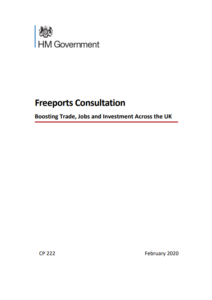The UK is working to advance economic activity across the UK, ensuring that towns, cities and regions across the country can begin to benefit from the opportunities of leaving the EU. As part of this work, the government aims to create up to 10 freeports in locations across the UK.
The government plans to establish freeports, which have different customs rules than the rest of the country, that are innovative hubs, boost global trade, attract inward investment and increase productivity. In doing so, the government wants freeports to provide employment opportunities to the benefit of some of our most deprived communities around the UK.
The government has the following objectives for UK freeports:
- Establish freeports as national hubs for global trade and investment across the UK;
- Promote regeneration and job creation;
- Create hotbeds for innovation.
[smlsubform prepend=”GET THE SAFETY4SEA IN YOUR INBOX!” showname=false emailtxt=”” emailholder=”Enter your email address” showsubmit=true submittxt=”Submit” jsthanks=false thankyou=”Thank you for subscribing to our mailing list”]
The proposed model includes tariff flexibility, customs facilitations and tax measures. It is also considering planning reforms, additional targeted funding for infrastructure improvements and measures to give incentives for innovation.
We want all the nations of the UK to be able to share in the benefits of freeports. We intend to work with devolved administrations to develop proposals to allow freeports to be created in Scotland, Wales and Northern Ireland, in addition to those in England
The British Ports Association has welcomed the publication of a new consultation on the introduction of free ports, which have the potential to transform coastal communities and unleash ‘port-centric’ growth.
What is a ‘free port’?
A freeport is an area outside of a country’s customs territory but within its physical borders, sometimes known as a ‘free zone’. This enables certain goods to be transhipped or processed through a port without attracting customs duties. This means that components could be added to a product and re-exported without generating additional prohibitive costs.
If the UK ends up striking a low-alignment trade deal with the EU, free ports may help alleviate cost burdens that may be placed on some industries that have cross-border supply chains.
Commenting on the new policy, the British Ports Authority (BPA) called Ministers to maximise their ambition and remove the cap on potential number of freeports and include a much broader package of measures that would benefit a wide range of different UK ports. Currently, the UK has 125 cargo-handling ports.
Freeport status will benefit ports differently depending on their current traffic/business profile and specialisation. Some will naturally be keener than others but there will be more than 10 of these that will want to benefit and Government should not place an arbitrary cap on this ambition
BPA said.
It also believes that freeports will not solve issues around new ‘frictions’ that will be introduced at certain gateway ports at the end of the Brexit transition period, but they could help some ports and traders deal with the range of new customs and other borders requirements at particular port operations.































































